必修一unit3复习学案(学生版)
- 格式:docx
- 大小:37.08 KB
- 文档页数:8
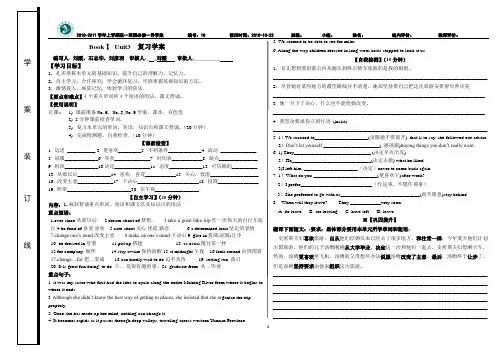
BookⅠUnit3 复习学案编写人: 刘霞,石志华,刘彦羽审核人:_ _刘霞审批人:__________【学习目标】1. 扎实掌握本单元的基础知识,提升自己的理解力、记忆力。
2. 自主学习,合作探究;学会循环复习,牢固掌握基础知识的方法。
3.激情投入,疯狂记忆,体验学习的快乐。
【要点和难点】4个重点单词和4个短语的用法,课文背诵。
【使用说明】正课::1)课前准备No.6,No.8,No.9学案,课本,双色笔2). 5分钟课前检查单词。
3). 复习本单元的单词,短语,知识点和课文背诵。
(20分钟)4). 完成检测题,自我检查。
(10分钟)【课前检查】1. 运送___________2. 更喜欢_________3. 不利条件_____________4. 流动______________5. 说服_____________6. 毕业______________7. 时间表____________8. 缺点_______________9. 组织_____________10.决定______________11. 态度_____________12. 可信赖的__________ 13. 从那以后_____________14. 喜欢,喜爱____________15. 关心,忧虑___________________ 16. 改变主意______________17. 下决心________________________18. 投降________________ 19. 照常_________________________20. 在午夜_________________【自主学习】(20分钟)内容:1.疯狂背诵重点单词、短语和课文以及知识点的用法.重点短语:1.ever since从那以后2.dream about\of梦想…3.take a great bike trip作一次伟大的自行车旅行4.be fond of喜爱,喜欢5.care about关心,忧虑,惦念6.a determined look坚定的表情7.change one’s mind改变主意8.make up one’s mind下决心9. give in投降;屈服;让步10. be dressed in穿着11.put up搭建12. as usual像往常一样13.for company 做伴14.stay awake保持清醒15.at midnight午夜16.look around向周围看17.change…for把…变成18.can hardly wait to do迫不及待19. setting sun 落日20. It is great fun/doing/ to do 干….是很有趣的事。
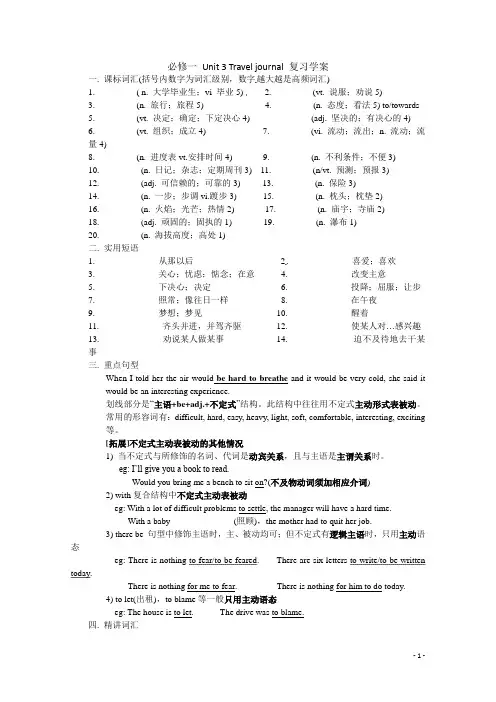
必修一Unit 3 Travel journal 复习学案一. 课标词汇(括号内数字为词汇级别,数字越大越是高频词汇)1. _________( n. 大学毕业生;vi 毕业5)2. _________(vt. 说服;劝说5)3. _________(n. 旅行;旅程5)4. _________(n. 态度;看法5) to/towards5. _________(vt. 决定;确定;下定决心4) _________(adj. 坚决的;有决心的4)6. _________(vt. 组织;成立4)7. _________(vi. 流动;流出;n. 流动;流量4)8. _________(n. 进度表vt.安排时间4) 9. _________(n. 不利条件;不便3)10. _________(n. 日记;杂志;定期周刊3) 11. _________(n/vt. 预测;预报3)12. _________(adj. 可信赖的;可靠的3) 13. _________(n. 保险3)14. _________(n. 一步;步调vi.踱步3) 15. _________(n. 枕头;枕垫2)16. _________(n. 火焰;光芒;热情2) 17. _________(n. 庙宇;寺庙2)18. _________(adj. 顽固的;固执的1) 19. _________(n. 瀑布1)20. _________(n. 海拔高度;高处1)二. 实用短语1. _____________ 从那以后2. _____________ 喜爱;喜欢3. _____________ 关心;忧虑;惦念;在意4. _____________ 改变主意5. _____________ 下决心;决定6. _____________ 投降;屈服;让步7. _____________ 照常;像往日一样8. _____________ 在午夜9. _____________ 梦想;梦见10. _____________ 醒着11. _____________ 齐头并进,并驾齐驱12. _____________ 使某人对…感兴趣13. _____________ 劝说某人做某事14. _____________ 迫不及待地去干某事三. 重点句型When I told her the air would be hard to breathe and it would be very cold, she said it would be an interesting experience.划线部分是“主语+be+adj.+不定式”结构。
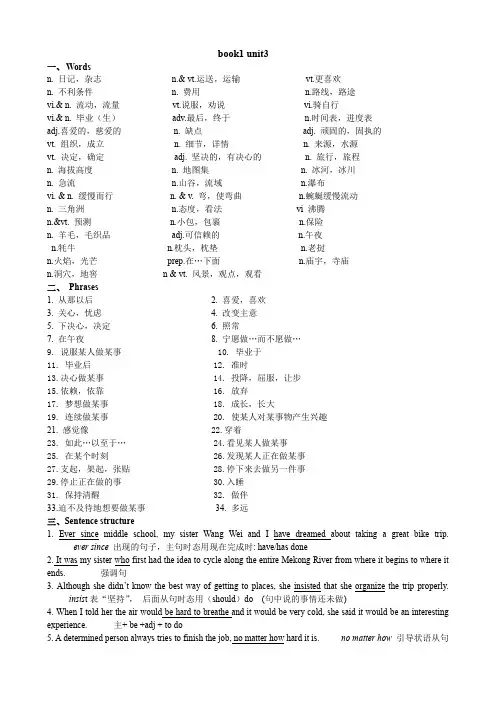
book1 unit3一、Wordsn. 日记,杂志n.& vt.运送,运输vt.更喜欢n. 不利条件n. 费用n.路线,路途vi.& n. 流动,流量vt.说服,劝说vi.骑自行vi.& n. 毕业(生)adv.最后,终于n.时间表,进度表adj.喜爱的,慈爱的n. 缺点adj. 顽固的,固执的vt. 组织,成立n. 细节,详情n. 来源,水源vt. 决定,确定adj. 坚决的,有决心的n. 旅行,旅程n. 海拔高度n. 地图集n. 冰河,冰川n. 急流n.山谷,流域n.瀑布vi. & n. 缓慢而行n. & v. 弯,使弯曲n.蜿蜒缓慢流动n. 三角洲n.态度,看法vi 沸腾n.&vt. 预测n.小包,包裹n.保险n. 羊毛,毛织品adj.可信赖的n.午夜n.牦牛n.枕头,枕垫n.老挝n.火焰,光芒prep.在…下面n.庙宇,寺庙n.洞穴,地窖n & vt. 风景,观点,观看二、Phrases1. 从那以后2. 喜爱,喜欢3. 关心,忧虑4. 改变主意5. 下决心,决定6. 照常7. 在午夜8. 宁愿做…而不愿做…9. 说服某人做某事 10. 毕业于11. 毕业后 12. 准时13.决心做某事 14. 投降,屈服,让步15.依赖,依靠 16. 放弃17. 梦想做某事 18. 成长,长大19. 连续做某事 20. 使某人对某事物产生兴趣21. 感觉像 22.穿着23. 如此…以至于… 24.看见某人做某事25. 在某个时刻 26.发现某人正在做某事27.支起,架起,张贴 28.停下来去做另一件事29.停止正在做的事 30.入睡31. 保持清醒 32. 做伴33.迫不及待地想要做某事34. 多远三、Sentence structure1. Ever since middle school, my sister Wang Wei and I have dreamed about taking a great bike trip.ever since出现的句子,主句时态用现在完成时: have/has done2. It was my sister who first had the idea to cycle along the entire Mekong River from where it begins to where it ends. 强调句3. Although she didn’t know the best way of getting to places, she insisted that she organize the trip properly.insis t表“坚持”,后面从句时态用(should)do (句中说的事情还未做)4. When I told her the air would be hard to breathe and it would be very cold, she said it would be an interesting experience. 主+ be +adj + to do5. A determined person always tries to finish the job, no matter how hard it is. no matter how引导状语从句6. At one point we were so high that we found ourselves cycling through clouds.so…that…中 that 引导结果状语从句四、Grammar 现在进行时表将来1.Where are we going?2.When are we leaving and when are we coming back?五、语法填空1. He preferred _________ (die) to stealing.2. Rather than _______ (go) to the cinema, he always prefers ___________ (stay) at home.3. They ____________ (stay) in the hotel ever since they came here.4. He was very ill and I __________ him ______ see a doctor. (persuade)5. I decide to set up a company of my own after _________. (graduate)6. It was Ann ________ took care of me when I was ill.7. It was in the middle school _______ I first saw Mike.8. He is f_______ of telling stories.9. We are d_________ to defend our motherland at all cost.10. It is no use persuading him. He will not change_____________. (mind)11. We have made up our _______ (mind) to keep out of their quarrels.12. The soldier has never given ______ to any hardship.13. Margie shows a very positive attitude _________ her work.14. None of us were late. We all arrived there on s_________.15. The train is __________ (arrive) in three hours.16. They are _________ (go) to Shanghai this Friday.17. They were dressed ______ their best clothes.18. Please get here early _____ usual.19. She insisted that we ____________ (stay) for dinner.20. English is hard ___________ (learn) in a short time.六、改错1. It was in 1998 when I worked in the factory.2. Although I wanted to come, but I was not free that evening.3. He made up mind to stop smoking.4. I don’t care what they say.5. I prefer to play football rather than to go fishing with him.6. Why weren’t you in at the midnight?7. The boy comes to school very early like usual.8. As time passing, things seemed to get worse.9. They wouldn’t change their mind no matter what you said.10. It was in the park where an accident happened to the old man.七、翻译句子1.从那以后,我再也没见过他。
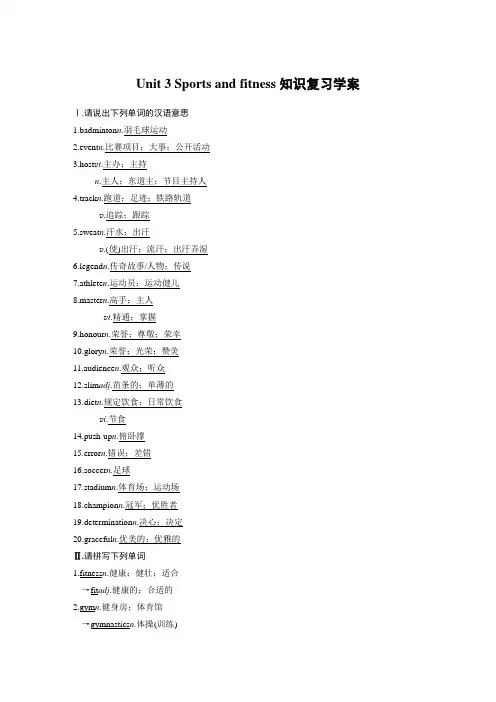
Unit 3 Sports and fitness知识复习学案Ⅰ.请说出下列单词的汉语意思1.badminton n.羽毛球运动2.event n.比赛项目;大事;公开活动3.host v t.主办;主持n.主人;东道主;节目主持人4.track n.跑道;足迹;铁路轨道v.追踪;跟踪5.sweat n.汗水;出汗v.(使)出汗;流汗;出汗弄湿6.legend n.传奇故事/人物;传说7.athlete n.运动员;运动健儿8.master n.高手;主人v t.精通;掌握9.honour n.荣誉;尊敬;荣幸10.glory n.荣誉;光荣;赞美11.audience n.观众;听众12.slim adj.苗条的;单薄的13.diet n.规定饮食;日常饮食v i.节食14.push-up n.俯卧撑15.error n.错误;差错16.soccer n.足球17.stadium n.体育场;运动场18.champion n.冠军;优胜者19.determination n.决心;决定20.graceful n.优美的;优雅的Ⅱ.请拼写下列单词1.fitness n.健康;健壮;适合→fit adj.健康的;合适的2.gym n.健身房;体育馆→gymnastics n.体操(训练)3.champion n.冠军;优胜者→championship n.锦标赛;冠军赛;冠军称号4.determine v.决定;决心→determination n.决心;决定5.injure v t.使受伤;损害→injured adj.受伤的;有伤的→injury n.伤害;损伤6.grace n.优雅;优美→graceful adj.优美的;优雅的7.failure n.失败;失败的人或事→fail v.失败;没通过pete v i.竞争;对抗→competition n.竞争;比赛→competitor n.竞争者;对手;参赛者→competitive adj.竞争性的;有竞争力的9.pretend v.假装;装扮lion num.一百万→millionaire n.百万富翁11.cheat n.欺骗手段;骗子v.作弊;欺骗;蒙骗12.positive adj.积极的;正面的;乐观的;肯定的13.rather ad v.相当;有点儿14.jog v i.&n.慢跑→jogging n.慢跑运动15.stress v t.强调;重读;使焦虑不安v i.焦虑不安n.压力;紧张;重音→stressful adj.充满压力的→stressed adj.紧张的,焦虑的Ⅲ.请说出下列短语搭配或句式1.与work有关的短语(1)work out锻炼身体,做运动;解决,解答;计算出;产生结果,发展;制订出(2)work on从事……;继续……(3)work at从事/致力于……2.与use有关的短语(1)be/become/get used to (doing) sth. 习惯于(做)某事(2)be used to do sth. 被用来做某事(3)used to do sth. 过去常常做某事(暗示现在已经不做了)3.与up有关的短语或句式(1)be up to sb. 由某人决定(2)be up to (doing) sth. 胜任(做)某事;正在忙于(做)某事(3)up to取决于;到达(某数量、程度等)(4)It’s up to sb. to do sth. 应由某人负责做某事。
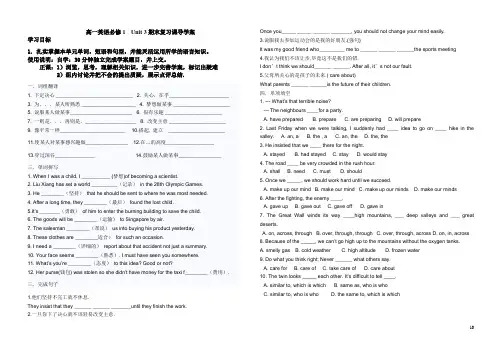
高一英语必修1 Unit 3期末复习课导学案学习目标1.扎实掌握本单元单词,短语和句型,并能灵活运用所学的语言知识。
使用说明:自学:30分钟独立完成学案题目,并上交。
正课:1)浏览,思考,理解相关知识,进一步完善学案,标记出疑难2)组内讨论并把不会的提出质疑,展示点评总结.一.词组翻译1. 下定决心 ___________________________2. 关心,在乎_____________________3. 为...某人所熟悉 ___________________4. 梦想做某事 ____________________5. 说服某人做某事______________________6. 很有乐趣 ____________________7. 一则是...再则是.__________________8. 改变主意 ____________________9. 像平常一样_______________________ 10.搭起, 建立____________________11.使某人对某事感兴趣做_______________ 12.在…的高度_________________13.穿过深谷______________ 14.鼓励某人做某事_______________三.单词拼写1. When I was a child, I __________ (梦想)of becoming a scientist.2. Liu Xiang has set a world _________(记录)in the 28th Olympic Games.3. He ________(坚持)that he should be sent to where he was most needed.4. After a long time, they ________(最后)found the lost child.5.It’s _______(勇敢)of him to enter the burning building to save the child.6. The goods will be ________(运输)to Singapore by air.7. The salesman ________(却说)us into buying his product yesterday.8. These clothes are ________适合)for such an occasion.9. I need a ________(详细的)report about that accident not just a summary.10. Your face seems ________(熟悉). I must have seen you somewhere.11. What’s you’re ________(态度)to this idea? Good or not?12. Her purse(钱包) was stolen so she didn't have money for the taxi f________(费用).三.完成句子1.他们坚持不完工就不休息.They insist that they ______ ______ _______until they finish the work.2.一旦你下了决心就不该轻易改变主意. Once you_____ _____ ______ _______, you should not change your mind easily.3.说服我去参加运动会的是我的好朋友.(强句)It was my good friend who_________ me to ______ ______ ______the sports meeting4.我认为我们不该让步,毕竟这不是我们的错.I don’t think we should______ ______. After all, it’s not our fault.5.父母所关心的是孩子的未来.( care about)What parents ______ ______is the future of their children.四.单项填空1. --- What’s that terrible noise?--- The neighbours ____for a party.A. have preparedB. prepareC. are preparingD. will prepare2. Last Friday when we were talking, I suddenly had ____ idea to go on ____ hike in the valley. A. an, a B. the , a C. an, the D. the, the3. He insisted that we ____ there for the night.A. stayedB. had stayedC. stayD. would stay4. The road ____ be very crowded in the rush hour.A. shallB. needC. mustD. should5. Once we _____, we should work hard until we succeed.A. make up our mindB. make our mindC. make up our mindsD. make our minds6. After the fighting, the enemy ____.A. gave upB. gave outC. gave offD. gave in7. The Great Wall winds its way ____high mountains, ___ deep valleys and ___ great deserts.A. on, across, throughB. over, through, throughC. over, through, acrossD. on, in, across8. Because of the _____, we can’t go high up to the mountains without the oxygen tanks.A. smelly gasB. cold weatherC. high altitudeD. frozen water9. Do what you think right; Never ______ what others say.A. care forB. care ofC. take care ofD. care about10. The twin looks _____ each other. It’s difficult to tell ____.A. similar to, which is whichB. same as, who is whoC. similar to, who is whoD. the same to, which is which10。
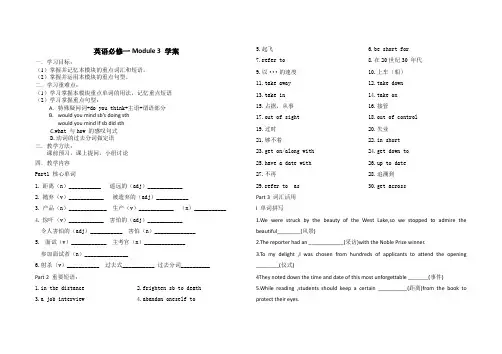
英语必修一Module 3 学案一.学习目标:(1)掌握并记忆本模块的重点词汇和短语。
(2)掌握并运用本模块的重点句型。
二.学习重难点:(1)学习掌握本模块重点单词的用法,记忆重点短语(2)学习掌握重点句型:A.特殊疑问词+do you think+主语+谓语部分B.would you mind sb’s doing sthwould you mind if sb did sthC.what 与how 的感叹句式D.动词的过去分词做定语三.教学方法:课前预习,课上提问,小组讨论四.教学内容Part1 核心单词1.距离(n)___________ 遥远的(adj)____________2.抛弃(v)____________ 被遗弃的(adj)___________3.产品(n)_____________ 生产(v)____________ (n)___________4.惊吓(v)____________ 害怕的(adj)____________令人害怕的(adj)___________ 害怕(n)______________5.面试(v)____________ 主考官(n)______________参加面试者(n)_______________6.射杀(v)___________ 过去式___________ 过去分词__________Part 2 重要短语:1.in the distance2.frighten sb to death3.a job interview4.abandon oneself to5.起飞6.be short for7.refer to 8.在20世纪30 年代9.以···的速度10.上车(船)11.take away 12.take down13.take in 14.take on15.占据,从事16.接管17.out of sight 18.out of control19.过时20.失业21.够不着22.in short23.get on/along with 24.get down to25.have a date with 26.up to date27.不再28.追溯到29.refer to as 30.get acrossPart 3 词汇活用I 单词拼写1.We were struck by the beauty of the West Lake,so we stopped to admire the beautiful________(风景)2.The reporter had an ____________(采访)with the Noble Prize winner.3.To my delight ,I was chosen from hundreds of applicants to attend the opening ________(仪式)4They noted down the time and date of this most unforgettable _______(事件)5.While reading ,students should keep a certain __________(距离)from the book to protect their eyes.6.Planting trees can prevent the__________(沙漠)expanding.7.Most old people would rather live in the countryside than live in _________(市中心) areas.8.The new couple have bought me a fashionable watch as a _________(纪念品)9.Our parents wished us a safe ________(旅行)as we drove away.10.You’d better find an ________(专家)to help you repair the computer.II 单句语法填空1.News of the robberies ________(frighten )many people into fitting new locks to their doors2.There was nobody in the ________(desert )street.3.The_______(exhaust)students are looking forward to a good night’s sleep.4.The kind woman has adopted more than ten disabled or sick babies _______(abandon)by others.5.Children should be _________(train)from an early age.6.They came here in search of new markets for their __________(produce)7.He was __________(shoot)in the back while trying to escape.8.When the accident happened ,the police were just ________the scene.III 选词填空:Get on take off out of date refer to at a speed of get intoBe short for in the distance1.The little boy ________________the bus as soon as it stopped ,but to his disappointment,there was no seat left.2.Please _________vocabulary about Market&Price if you want to know better about the article.3.Such people always stick to their views ,even if it means that they may________trouble.4.Her clothes are ________,which she doesn’t care about.5.It’s dangerous for a green hand like you to drive _____120 kilometers an hour.6.She __________after appearing in the Voice of China III in 20147.WTO___________the World Trade Organization.8.It was so dark that we couldn’t see anything________.IV 汉译英1.你建议我们什么时候举行会议谈论这个问题?。
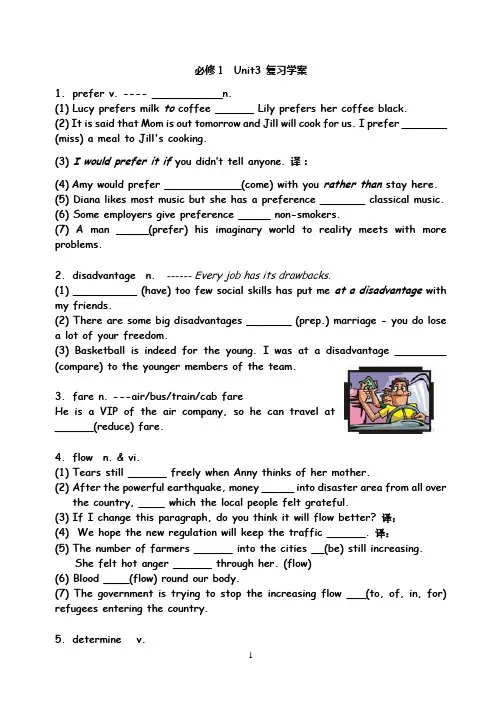
必修1 Unit3 复习学案1.prefer v. ---- ___________n.(1)Lucy prefers milk to coffee ______ Lily prefers her coffee black.(2) It is said that Mom is out tomorrow and Jill will cook for us. I prefer _______ (miss) a meal to Jill's cooking.(3) I would prefer it if you didn’t tell anyone. 译:(4)Amy would prefer ____________(come) with you rather than stay here.(5) Diana likes most music but she has a preference _______ classical music.(6) Some employers give preference _____ non-smokers.(7) A man _____(prefer) his imaginary world to reality meets with more problems.2.disadvantage n. ------ Every job has its drawbacks.(1) __________ (have) too few social skills has put me at a disadvantage with my friends.(2) There are some big disadvantages _______ (prep.) marriage - you do losea lot of your freedom.(3) Basketball is indeed for the young. I was at a disadvantage ________ (compare) to the younger members of the team.3.fare n. ---air/bus/train/cab fareHe is a VIP of the air company, so he can travel at______(reduce) fare.4.flow n. & vi.(1)Tears still ______ freely when Anny thinks of her mother.(2)After the powerful earthquake, money _____ into disaster area from all overthe country, ____ which the local people felt grateful.(3)If I change this paragraph, do you think it will flow better? 译:(4) We hope the new regulation will keep the traffic ______. 译:(5)The number of farmers ______ into the cities __(be) still increasing.She felt hot anger ______ through her. (flow)(6) Blood ____(flow) round our body.(7) The government is trying to stop the increasing flow ___(to, of, in, for) refugees entering the country.5.determine v.____________n. __________ adj.(1)We determined to start early. We determined ___ an early start.Faith is taking the first step even when you don't see the whole staircase.-- Martin Luther King, Jr.(2) Wisdom, courage and ______ are key factors for one to succeed.(3) The aim of the inquiry was _____ what had caused the accident.( determine)(4) _______ to succeed (determine), Benny spared no effort to improve her study.(5) We all know ___ to do, but she will determine ___ it is to be done. ( how, what)(6) It used to be very difficult to determine __________________(一座山有多高)。
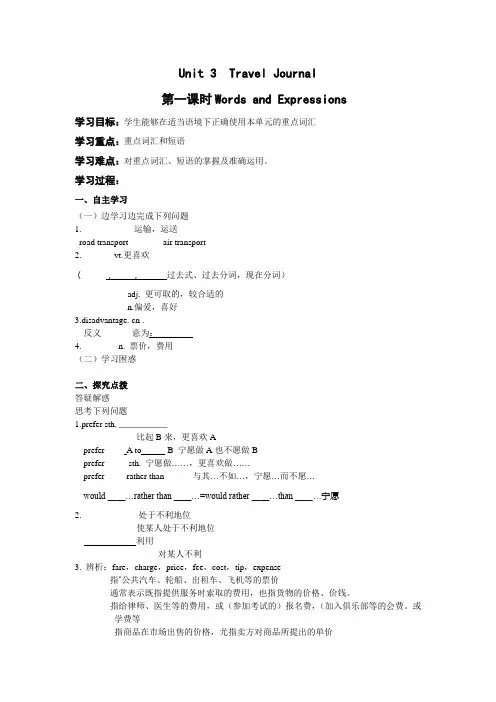
Unit 3 Travel Journal第一课时Words and Expressions学习目标:学生能够在适当语境下正确使用本单元的重点词汇学习重点:重点词汇和短语学习难点:对重点词汇、短语的掌握及准确运用。
学习过程:一、自主学习(一)边学习边完成下列问题1.___________ 运输,运送road transport________air transport _______2._______ vt.更喜欢(_____,,过去式、过去分词,现在分词)________ adj. 更可取的,较合适的________ n.偏爱,喜好3.disadvantage. cn .___________反义_______意为:________4.________ n. 票价,费用(二)学习困惑二、探究点拨答疑解惑思考下列问题1.prefer sth. ______________________ 比起B来,更喜欢Aprefer ____ A to _____ B 宁愿做A也不愿做Bprefer_____ sth. 宁愿做……,更喜欢做……prefer ____ rather than _____ 与其…不如…,宁愿…而不愿…would ____…rather than ____…=would rather ____…than ____…宁愿2._____________处于不利地位____________使某人处于不利地位利用________________ 对某人不利3. 辨析:fare,charge,price,fee,cost,tip,expense_____指…公共汽车、轮船、出租车、飞机等的票价_____通常表示既指提供服务时索取的费用,也指货物的价格、价钱。
_____指给律师、医生等的费用,或(参加考试的)报名费,(加入俱乐部等的会费。
或学费等______指商品在市场出售的价格,尤指卖方对商品所提出的单价______指生产某东西的成本、也泛指商品价格,有时=price。
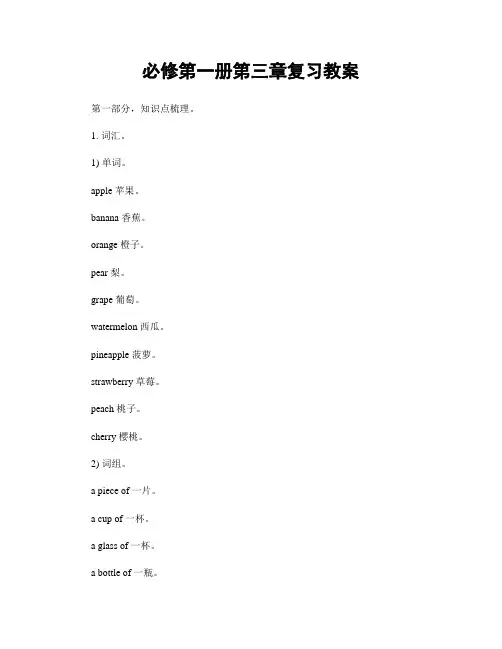
必修第一册第三章复习教案第一部分,知识点梳理。
1. 词汇。
1) 单词。
apple 苹果。
banana 香蕉。
orange 橙子。
pear 梨。
grape 葡萄。
watermelon 西瓜。
pineapple 菠萝。
strawberry 草莓。
peach 桃子。
cherry 樱桃。
2) 词组。
a piece of 一片。
a cup of 一杯。
a glass of 一杯。
a bottle of 一瓶。
some juice 一些果汁。
How many...? 多少个/多少杯/多少瓶。
How much...? 多少钱/多少重量。
2. 语法。
1) 名词的复数形式。
一般情况下,在名词后面加-s构成复数形式,如,apple—apples,banana—bananas。
以s, x, ch, sh结尾的名词,加-es构成复数形式,如,box—boxes, glass—glasses。
以辅音字母+y结尾的名词,变y为i再加-es构成复数形式,如,cherry—cherries。
不规则变化,如,child—children, foot—feet。
2) 物主代词的用法。
形容词性物主代词,my, your, his, her, its, our, their。
名词性物主代词,mine, yours, his, hers, its, ours, theirs。
第二部分,练习题。
1. 选择题。
1) —How many ________ do you want?—I want two ________.A. apple; apple。
B. apples; apples。
C. apple; apples。
D. apples; apple。
2) There are some ________ on the table.A. banana。
B. bananas。
C. apple。
D. oranges。
3) —________ are these?—They are my ________.A. Who; book。
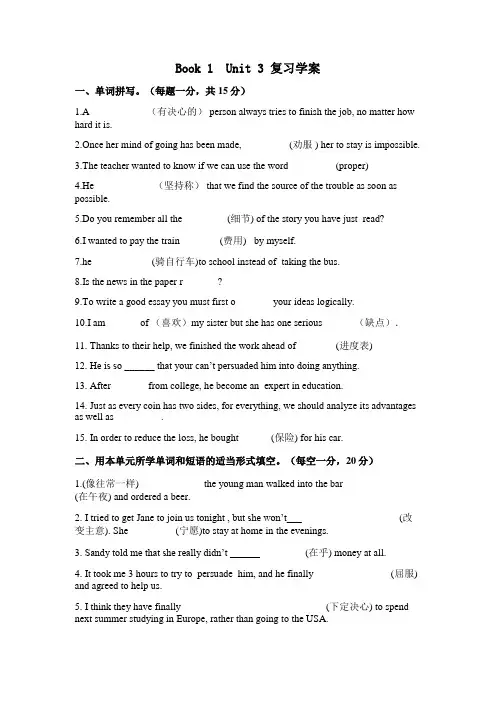
Book 1 Unit 3 复习学案一、单词拼写。
(每题一分,共15分)1.A ___________(有决心的) person always tries to finish the job, no matter how hard it is.2.Once her mind of going has been made, _________(劝服 ) her to stay is impossible.3.The teacher wanted to know if we can use the word _________(proper)4.He ___________ (坚持称) that we find the source of the trouble as soon as possible.5.Do you remember all the ________ (细节) of the story you have just read?6.I wanted to pay the train _______ (费用) by myself.7.he ___________ (骑自行车)to school instead of taking the bus.8.Is the news in the paper r_______?9.To write a good essay you must first o_______ your ideas logically.10.I am _____ of (喜欢)my sister but she has one serious ______(缺点).11. Thanks to their help, we finished the work ahead of _______ (进度表)12. He is so ______ that your can’t persuaded him into doing anything.13. After ______ from college, he become an expert in education.14. Just as every coin has two sides, for everything, we should analyze its advantages as well as _________.15. In order to reduce the loss, he bought ______(保险) for his car.二、用本单元所学单词和短语的适当形式填空。
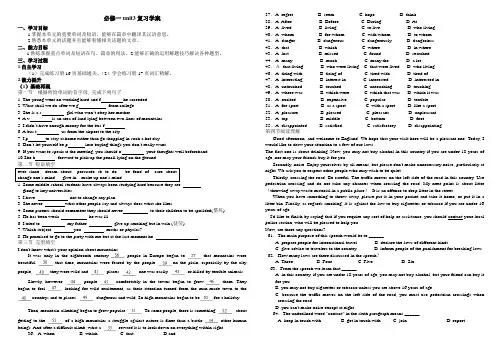
必修一unit3复习学案一、学习目标 1.掌握本单元的重要单词及短语,能够在篇章中翻译其汉语意思。
2.熟悉本单元的话题并且能够看懂相关话题的文章。
二、能力目标 1.熟练掌握重点单词及短语在句、篇章的用法。
2.能够正确的运用解题技巧解决各种题型。
三、学习过程 1.自主学习 (1)完成练习册16页基础通关。
(2)学会练习册17页词汇精解。
2.能力提升 (1)基础再现 第一节 根据所给单词的首字母, 完成下列句子 1. The young went on working hard and f he scceeded. 2. What shall we do after we g from college. 3. She is a s girl who won ’t obey her mother. 4. A v is an area of land lying between two lines of mountains. 5. I didn ’t have enough money for the bus f . 6. A bus t us from the airport to the city.7. I p to stay at home rather than go shopping in such a hot day. 8. Don ’t let yourself be p into buying things you don ’t really want.9. If you want to speak at the meeting, you should o your thoughts well beforehand. 10.She b forward to pick up the pencil lying on the ground.giong to key universities.2. I have not to change any plan.3. She never what other people say and always does what she likes.4. Some parents should remember they should never to their children to be spoilded(惯坏).5. He has been weak he was ill.6. I tried to my father give up smoking but in vain (徒劳).7. Which subjectyou, maths or physics?8. He promised to go to the party with me but at the last moment he.第三节完型填空I don't know what's your opinion about mountains.It wasonly in the eighteenth centurypeople in Europebegan to that mountains were beautiful.that time, mountains were feared bythe people on the plain, especially by the citypeople, they were wild andplacesone was easily or killed by terrible animals.Slowly, however,people comfortably in thetowns began togrow them. Theybegan to feel looking for wild excitement, as their attention turned from the man-made town to thecountry; and to places dangerous and wild. So high mountains began to be for a holiday. Then, mountain-climbing began to grow popularTo some people, there is somethingaboutgetting to the of a high mountain: a struggle against nature is finer than a battle other human beings. And after a difficult climb, what a reward it is to look down on everything within sight. 36.A. when B. which C. that D.and37.A. regret B. seem C. hope D. think38.A. After B. Before C. During D. At39.A. lived B. living C. to live D. who living 40.A. whom B. for whom C. with whom D. to whom 41.A. danger B. dangerous C. dangerously D. dangerless42.A. that B. which C. where D. in where 43.A. lost B. missed C. found D. searched 44.A. many B. much C. many the D. a lot45.A. that living B. who were living C. that were lived D. who living 46.A. tiring with B. tiring of C. tired with D. tired of47.A. interesting B. interest in C. interested D. interested in 48.A. untouched B. touched C. untouching D. touching 49.A. where was B. which were C. which that was D. which it was 50.A. excited B. expensive C. popular D. terrible 51.A. for sport B. as a sport C. with a sport D. like a sport 52.A. pleasure B. pleased C. pleasant D. unpleasant 53.A. top B. middle C. bottom D. foot55.A. disappointed B. satisfied C. satisfactory D. disappointing 第四节阅读理解Good afternoon, and welcome to England. We hope that your visit here will be a pleasant one. Today, I would like to draw your attention to a few of our laws.The first one is about drinking. Now, you may not buy alcohol in this country if you are under 18 years of age, nor may your friends buy it for you.Secondly, noise. Enjoy yourselves by all means, but please don't make unnecessary noise, particularly at night. We ask you to respect other people who may wish to be quiet.Thirdly, crossing the road. Be careful. The traffic moves on the left side of the road in this country. Use pedestrian crossing and do not take any chances when crossing the road. My next point is about litter (throwing away waste material in a public place ). It is an offence to drop litter in the street.When you have something to throw away, please put it in your pocket and take it home, or put it in a litter bin. Finally, as regards smoking, it is against the law to buy cigarettes or tobacco if you are under 16 years of age.I'd like to finish by saying that if you require any sort of help or assistance, you should contact your local police station, who will be pleased to help you. Now, are there any questions?61.The main purpose of this speech would be to ______.A. prepare people for international travelB. declare the laws of different kindsC. give advice to travelers to the countryD. inform people of the punishment for breaking laws 62.How many laws are there discussed in the speech ?A. Three.B. Four.C. Five.D. Six.63.From the speech we learn that ______.A. in this country, if you are under 18 years of age, you may not buy alcohol, but your friend can buy itfor youB. you may not buy cigarettes or tobacco unless you are above 16 years of ageC. because the traffic moves on the left side of the road, you must use pedestrian crossings whencrossing the roadD. you can't make noise except at night64.The underlined word "contact" in the sixth paragraph means ______.A. keep in touch withB. get in touch withC. joinD. report。
重点单词1.方面;层面n.__________________2.印象;印记n.____________________________3.在前的;早先的 adj._______________4. 指导;向导n.指导;指引vt.______________5. 缺乏n.﹠vi.﹠vt.________________6. 乐观的 _________________________________7. 容忍;忍受vt. __________________8.瞬间;片刻n.立即的adj.__________________9. 定居,解决n. ___________________ 10. 代表;典型人物n. ______________________ 11. 原料;材料n. __________________ 12.纽扣,按钮n. ___________________________ 13. 贪吃的;贪婪的adj._____________ 14.系牢;扎牢vt. __________________________ 15.调整;调节n.____________________ 16.吞下;咽下vt.___________________________ 17.按;压;印刷;新闻n.____________ 18.动机n.__________________________________ 19.回收利用;再利用vt._____________ 20.开关;转换n.____________________________ 识记单词1. tablet ______________________2. capsule ___________________3. efficiency_________________4.disposal n. _________________5. receiver _____________________6.manufacture vt.______________高频短语1.___________ 拿起;接受;开始;继续2._______________ (困境后)恢复;完全复原3.________________ 看不见…… 4.________________ 打扫;横扫5.________________ 移动;溜进…… 6.________________ 加速7.________________ 适应 8.________________ 关掉9.________________ 缺少;缺乏 10.________________ 对……不确定用以上短语的正确形式填空。
必修一Unit 3复习学案一、词块知识清单1. 在国内外2. 跟随;到达;进步;赶快3. 参加4. 田径运动会5. 田径6. 锻炼;计算出;解决7. 获得成功;准时到达8. 减重9. 活着的传奇人物10. 树立榜样11. 把......联系起来12. 为....带来荣耀和荣誉13. 世界锦标赛14. 破裂;破碎;崩溃15. 丧失信心;泄气16. 面临困难17 世界冠军18. 时间凝固;时间静止19. 被称作....20. 精神力量21. 找到制胜的方法22. (做)某事的秘诀23. 接受失败24. 放弃;投降25. 为....竞争.26. 有道理;合乎情理;表述清楚27. 假装做某事28. 即使;虽然29. 发疯;疯狂30. 有作用或影响31. 停止做(或使用、食用) ;剪下32. 有时;偶尔33. 与...比较34. 列出清单35. 对...积极乐观的36. 与....相似37. 在...中起作用38. 做某事没有用/意义39. 在某人看来二、语法填空1.If you want to lose weight, I remend ________ (use) the spin bike.2.I used to ______ (e) here every day when I first started.3.They must be athletes _______ are masters in their sports and also set good examples _______ others.4.Isn't it amazing how the human body heals itself after an __________ (injure)?5.Write a poem about how courage,determination, and _________(strong) have helped you face challenges in your life6.Though the medicine for your disease is working,you should work _____regularly in the open air.7.Are you free tonight? Would you like to e ________ with us to watch the film?8.Climbing Mount Tai had been my dream, but it was not until last year that I managed to make ________.9.It is said that the laba porridge is a food custom _______ honour of Chinese national hero Yue Fei.10.My friend suggested that we should sit down to work _______ a practical plan.11.If you want to sell your car, why not _______ (put) an advertisement in the local paper?12.The accident made to him lose his job, so he thought of himself as _____ failure.13.Hard work, __________(determine) and perseverance always win out.14.It is believed that parents can make a great ____________ (different) to the life of their children.15.I’m sorry to know that you feel _________ (stress) as a high school freshman.16.More than fifty students took part in this _________(pete) to pete ________ the first prize.17.In order to keep slim, I decide to go _______ a diet.18.I passed by John quickly without greeting him, pretending not _______ (see) him.19.Students are encouraged to take control of their own learning, rather _________ just depending on the teacher.20.There is little milk in the milk bottle, ________ there?21.You are going to the gym with me, ___________ you?22.She likes playing soccer, _________ she?23.Tom didn’t return home until 10 o’clock last night, _______ he?24.They can’t finish it by Friday, ________ they?25.You have never read such an interesting story, _________?26.Don’t go near the bank of the river, ________?三、教材金句1. 作为一名运动员,郎平为她的祖国赢得了诸多荣誉。
Unit 3 Travel journal班级姓名小组________第____号【学习目标】1.通过自主学习复习本单元重点词汇拼写。
2.通过教师讲解回顾所学拓展语法。
3通过小组讨论完成本单元复习习题。
【重点难点】重点:记住学案上的拓展语法,能完全掌握语法。
难点:能运用所学单词和语法完成习题。
【考点分析】能够运用所学重点单词、短语写出完整正确的句子【学情分析】学生通过自主学习和小组讨论能够完成复习习题,但是部分拓展语法仍然掌握情况不好。
【导学流程】自主学习内容一、回顾旧知听写单词二基础知识感知:单词速背运输____________prefer____________不利条件___________说服____________毕业____________最后___________时间表___________喜爱的___________缺点___________顽固的____________.组织_________决定____________坚决的___________态度___________预测____________可信赖的___________三、探究问题1.Which kind of transport do you p________ to use:bus or train?2,My brother p________ the country to the city3.They have not seen each other e_____ ______ last year.4.Two years ago she bought an expensive mountain bike and then she p_________ me to buy one.5.After g________ from college,we finally got the chance to take a bike trip.6.What' s your attitude________ this idea?7.The children were required to g_____ _______ their homework straight away.8.Now she is planning our s_______ for the trip9.Of course she hadn’t;my sister doesn’t c_______ _______details.10.The famous actress is a___________ (graduate)of Beijing Film Academy.11.He___________ (care for) his sick mother at home12.You'd better finish the project on s_______.四、基础知识拓展与迁移请及时记录自主学习过程中的疑难:小组讨论问题预设:句型1.Although she didn't know the best way of getting to places. she insisted that she organize the trip properly尽管她对去某些地方的最佳路线并不清楚她却坚持要自己把这次旅行安排得尽善尽美。
必修一unit3复习学案课本原句:Which kind of transport do you prefer to use: bus or train? 你更喜欢哪种交通方式,公共汽车还是火车?1.transport n. & vt. 运送;运输transport sb./sth. to...把……运到……means of transport交通工具public transport公共交通【即时应用】我们雇了两艘运输船来将那些新轿车运输到日本。
(1). We hired two (1) _________________ to (2)___________________ those new cars to Japan.(2). You will _____________________________ the resort by coach.游览车将把你们送到度假胜地。
(3). The goods ____________________________ by plane.货物用飞机运送。
课本原句:Which kind of transport do you prefer to use:bus or train? 你更愿意用哪种交通工具:汽车还是火车?2.prefer v.更喜欢; 宁愿preference n. 喜爱;偏爱;优惠;优待重点句型:prefer( sb.) to do sth 更喜欢/ 愿意(某人)做某事(具体、一次性的动作)prefer doing sth. 喜欢做某事(习惯性、经常性的动作)prefer (doing) sth. to (doing) sth.喜欢(做)……而不喜欢(做)……prefer (sb. ) to do sth. rather than do sth.宁愿(某人)做某事而不愿做某事would prefer that +sb. +(should) do sth. 愿意让某人做某事(从句使用虚拟语气)have a preference for 偏爱;喜爱I much prefer cats to dogs. 猫和狗之中我更喜欢猫。
I prefer walking to cycling. 我喜欢步行更甚于骑自行车。
I’d prefer it if you didn’t smoke in front of the children. 我希望你不要在孩子面前抽烟。
I would prefer that you (should)not mention my name. 我希望你不要说出我的名字。
He prefers to stay at home rather than go shopping. 他宁可呆在家里也不愿意去逛商店。
【即时应用】(1)I prefer __________________(=__________________) there.我宁愿步行去那儿。
(2)He said he ______________ the country ______ the city. 他说城市和乡村相比,他更喜欢乡村。
(3)She prefers ____________ to ____________. 跳舞和唱歌相比,她更喜欢跳舞。
(4)The soldier preferred ____________ rather than ____________.这位战士宁死不屈。
(5)I'd prefer you __________________ there alone. 我倒希望你不要单独去那儿。
(6)We prefer that they (______) ______ it in a different way.我们倒希望他们用一种不同的方法去做。
(1) Rather than go shopping, I prefer______ at home, sleeping.A. stayB. to stayC. stayingD. stayed(2) — Which do you ______ better, coffee or tea?— Both.A. preferB. likeC. chooseD. have(3). Even on a cold day he prefers ________out to play football ________at home.A.going;rather stay B.going;to stayingC.to go;rather than staying D.to go;rather than to stay课本原句:Two years ago she bought an expensive mountain bike and then she persuaded me to buy one. 两年前,她买了一辆昂贵的山地车,然后说服我也买了一辆。
3. persuade v. 说服;劝说;使某人信服[重点用法]persuade sb. to do sth.= persuade sb. into doing sth. 说服某人做某事persuade sb. not to do sth. = persuade sb. out of sth./doing sth. 劝阻某人做某事persuade sb. of sth. 使某人相信某事persuade that-clause 使某人相信...(1). 根据上下文,用与persuade相关的词语填空The other day, my husband (1) _____________ me not _______ buy a coat as he thought it was too long. However, the assistant tried hard to (2) ________________ me (3) ________ the good quality and fashionable style of it. Therefore, I couldn't help(4) ____________________________buying it. So you can see how easy it is (5)__________________ a woman (6)______________________ buying things that aren't suitable for her.(2).完成句子①不要被说服买你实际上并不需要的东西。
Don’t let yourself ________ ________ ________buying things you don’t really need.②她劝我不要放弃工作,离开家人。
She ________ ________ ________ ________ ________ ________the job and leaving the family.③我还不能完全信服这个计划的优点。
I am still not fully ________ ________ the plan’s advantages.(3) 单项选择①Alice trusts you; only you can ___________ her to give up the foolish idea.A. suggestB. attractC. temptD. persuade②Mr. Li no longer smokes now because his wife __________ him to give up smoking last year.A. suggestedB. advisedC. persuadedD. told课本原句:She insisted that she (should) organize the trip properly.4、insist v.根据语境猜词义根据语义找匹配:A. 坚持认为 B. 坚决要求某人做某事(1) He insisted that he hadn't made a mistake.(2) The bodyguards insisted that the president (should) keep away from the crowd for the sake of safety.重点句型:insist on/upon sth. 坚持(某事物) insist on doing sth. 坚决干某事insist+that从句:①表“坚决要求”,从句谓语用虚拟语气②表“坚持说;坚持认为”,从句谓语用陈述语气insist on/ stick to的区别;(1)insist on表示对“要求、意见、看法等”的“坚持”,后面可接动名词或动名词的复合结构;(2)stick to表示对“真理、岗位、计划、理论、愿望、原则、决定、诺言或某种理论”客观上的“坚持”。
常接虚拟语气“(should) + 动词原形”结构的动词五个“要求”dema nd, require, request, ask, urge 四个“建议”suggest, advise, propose, recommend两个“命令”command, order 一个“坚持”insist单项填空(1)The doctor insisted that I ______ a high fever and that I ______ a rest for a few days.A. had; hadB. have; haveC. had; haveD. have; had(2)No matter what you say, I shall ______ my opinion.A. carry outB. keep upC. insist onD. stick to(3)The man insisted ________ a taxi for me even though I told him I lived nearby.A. findB. to findC. on findingD. in finding(4)Seeing that he was so seriously ill, I insisted that he ______ to hospital at once.A.was sent B.be sent C.will be sent D.had been sent(5)The old worker insisted that he ______ old and ______ back to the working post again.A.wasn’t; be sent B.wasn’t; was sent C.be not; send D.isn’t; sent(6)She insisted ______ to Miami for her summer vacation though it would cost much money.A.on taking B.on being taken C.to take D.to be taken(7)Sam insisted that he ______ the law and ______.A.didn’t break; mustn’t be pu nished B.doesn’t break; shouldn’t punishC.hadn’t broken; be not punished D.hadn’t broken; not be punished课本原句:Now she is planning our schedule for the trip. (P18) 现在,她正为这次旅行制订计划。